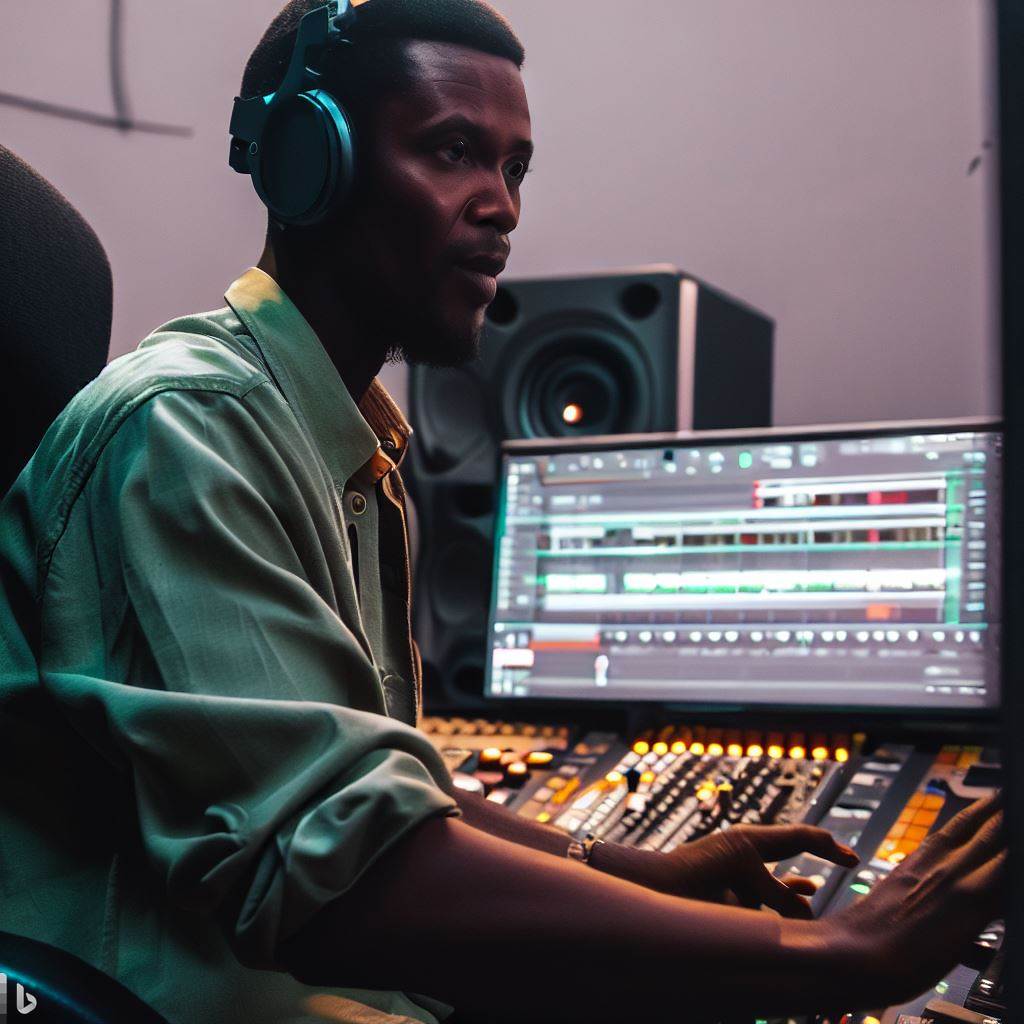Introduction
Sound effects editing is a crucial aspect of post-production in the media industry.
It involves manipulating and enhancing audio elements to create a more immersive and realistic experience for the audience.
Sound effects editing includes tasks such as selecting, creating, and arranging sound effects to enhance the overall audio quality of a project.
Sound effects play a vital role in various media industries, such as film, television, radio, and video games. They help in setting the mood, creating atmosphere, and bringing scenes to life.
One of the major challenges faced by sound effects editors in Nigeria is the lack of resources and equipment.
Many editors struggle with limited access to professional-grade equipment and facilities.
Another challenge is the limited availability of quality sound libraries in Nigeria. Editors often have to rely on limited or outdated sound effects collections, which hampers their creative process.
Due to financial constraints, many sound effects editors in Nigeria struggle to afford professional editing software and hardware, which can significantly impact the quality of their work.
Furthermore, the lack of adequate recording equipment and facilities adds to the challenges faced by sound effects editors.
This limits their ability to capture high-quality real-world sounds for their projects.
In fact, sound effects editors in Nigeria confront challenges like limited resources, equipment, and access to quality sound libraries.
They also deal with insufficient funds for software, hardware, and recording facilities.
Despite these obstacles, their dedication and creativity persist in bringing captivating soundscapes to various media productions.
Read: Nigeria’s Entertainment Industry: A Goldmine for Creative Professionals
Limited knowledge and training opportunities
Sound effects editors in Nigeria often face the challenge of having limited access to knowledge and training opportunities.
The field of sound editing is not widely explored, resulting in a lack of resources and educational programs.
Scarcity of specialized courses and workshops
Another major challenge for sound effects editors in Nigeria is the scarcity of specialized courses and workshops.
Unlike other creative fields, such as filmmaking or music production, there are very few opportunities to learn in-depth sound editing techniques and skills.
Lack of mentors and experienced professionals in the field
The absence of mentors and experienced professionals in the field of sound effects editing makes it difficult for aspiring editors to receive guidance and support.
Without proper guidance, it becomes challenging to develop and refine their skills.
Dependence on self-learning and online tutorials
Due to the limited access to formal training, sound effects editors in Nigeria often rely on self-learning and online tutorials.
While online resources can be helpful, they may not provide the same level of personalized guidance and feedback as a mentor or instructor.
Read: Tools Every Nigerian Sound Effects Editor Needs
Cultural barriers
Cultural barriers pose a significant challenge for sound effects editors in Nigeria.
With a diverse cultural landscape, different tribes and ethnic groups have various beliefs and customs regarding sound.
This can limit the creativity and experimentation of sound editors, as they must navigate these cultural sensitivities while still trying to create impactful and engaging sound designs.
These challenges include cultural barriers, limited appreciation for sound design, perception of sound editing as a low-skilled job, and lack of recognition and support from the industry.
Limited appreciation for sound design in Nigeria
Another challenge is the limited appreciation for sound design in Nigeria. Compared to other aspects of media production, sound design often takes a backseat.
The industry and audiences often prioritize visuals and dialogue over the quality and creativity of sound effects.
This lack of appreciation can discourage sound editors and limit their opportunities for growth and recognition.
Perception of sound editing as a low-skilled job
Perception of sound editing as a low-skilled job further adds to the challenges faced by sound effects editors in Nigeria.
Many people still view sound editing as a simple task that requires little technical or creative expertise.
This perception undermines the importance of sound design and leads to a lack of investment in training and development opportunities for sound editors.
Lack of recognition and support from the industry
Moreover, the lack of recognition and support from the industry compounds the challenges faced by sound effects editors.
The industry often fails to acknowledge the crucial role of sound design in enhancing storytelling and audience engagement.
This lack of recognition translates into limited opportunities for sound editors to showcase their skills and get the recognition they deserve.
In summary, Nigerian sound editors encounter challenges like cultural barriers, low appreciation for their craft, perception as low-skilled work, and industry neglect.
It is crucial for the industry to address these challenges through awareness-building, investment in training, and active recognition and support.
Only then can sound editors thrive and contribute their creative expertise to the Nigerian media landscape.
Read: How to Become a Sound Effects Editor in Nigeria
Language diversity challenges
The requirement to create sound effects in various local languages
Nigeria’s linguistic diversity poses a major challenge for sound effects editors.
- The requirement to create sound effects in various local languages adds complexity to their work.
- Translating sound effects into different languages requires additional time and effort.
- Accurately capturing the cultural nuances of each language becomes essential for an authentic experience.
Difficulty in finding appropriate and high-quality localized sound effects
Locating suitable sound effects that accurately represent the Nigerian context is a daunting task.
The limited availability of high-quality localized sound effects hinders the editors’ creativity and productivity.
Generic sound effects often fail to capture the essence of Nigerian culture and environment. Editors must search extensively or resort to creating their own sounds from scratch.
In short, sound effects editors in Nigeria face significant challenges due to language diversity and the need for localized sound effects.
However, by leveraging resources, collaborating with linguistic and cultural experts, and encouraging creativity, these challenges can be overcome.
The efforts required to address these challenges will result in a more immersive and culturally authentic media experience for Nigerian audiences.

Time constraints and unrealistic deadlines
When it comes to sound effects editing in Nigeria, there are numerous challenges that editors face on a regular basis.
Editors often find themselves working under tight time constraints, leaving little room for error or experimentation.
These challenges range from time constraints and unrealistic deadlines to limited time for post-production due to tight shooting schedules.
Additionally, there is immense pressure to deliver high-quality sound effects within short periods. Let’s delve deeper into these challenges:
Limited time for post-production due to tight shooting schedules
- In Nigeria’s film industry, shooting schedules are often packed, leaving minimal time for post-production.
- Sound effects editors are left with little time to properly analyze and enhance the audio elements.
- This limitation can result in rushed editing, compromising the overall quality of the final product.
Pressure to deliver high-quality sound effects within short periods
- Clients and production teams expect sound editors to provide top-notch sound effects, regardless of the time constraints.
- This pressure can hinder creativity and innovative techniques that take time to develop.
- Editors have to find a balance between meeting tight deadlines and ensuring the sound effects enhance the film effectively.
In essence, the challenges faced by sound effects editors in Nigeria, such as time constraints, limited post-production time, and pressure to deliver high-quality work, can be daunting.
However, by employing efficient time management, effective communication, and streamlined workflows, these challenges can be overcome.
It is essential for editors to find a balance between meeting deadlines and delivering the best possible sound effects for Nigerian films.
Read: Market Demand for Sound Effects Editors in Nigeria
Gain More Insights: Music Education: Preparing for a Director Role in Nigeria
Lack of collaboration and communication
One major hurdle that sound effects editors in Nigeria face is the lack of collaboration and communication.
Filmmaking is a team effort, and sound editors need to work closely with other departments, such as visual effects and audio production.
Unfortunately, in Nigeria, there is limited cooperation between sound editors and these departments, leading to disjointed work and a compromised final product.
This blog section will explore some of these challenges and shed light on their impact.
1. Limited cooperation between sound editors and other departments
Another challenge related to collaboration is the limited cooperation between sound editors and other departments.
Film production involves a variety of professionals, each with their own responsibilities.
However, in Nigeria, sound editors often find themselves isolated from the rest of the team.
This makes it difficult to understand the vision of the director and effectively contribute to the overall sound design.
2. Inadequate communication channels between editors and producers/directors
Effective communication is essential in any field, and this is particularly true for sound effects editors.
However, in Nigeria, there is a lack of proper communication channels between editors and producers/directors.
This leads to misunderstandings, delays in feedback, and the inability to address specific preferences or instructions. Ultimately, this compromises the quality of the final product.
3. Challenges in obtaining necessary feedback and clarifications
Sound effects editing requires continuous feedback and clarification from the production team.
However, in Nigeria, editors often struggle to obtain the necessary feedback due to various reasons, such as a lack of defined processes or a disorganized workflow.
This can result in a time-consuming and frustrating editing process, hindering the sound editor from delivering their best work.
Despite these challenges, sound effects editors in Nigeria continue to persevere and find ways to overcome them.
They may resort to using alternative communication channels, such as social media platforms, to connect with other professionals and seek collaboration.
Additionally, some editors take the initiative to educate and raise awareness about the importance of effective communication and collaboration in sound design.
To address these challenges more effectively, it is crucial for the Nigerian film industry to recognize the significance of sound effects editing and provide adequate resources and support.
Foster collaboration, clear communication, and value sound editors’ contributions for achieving this.
Basically, sound effects editors in Nigeria face various challenges that hinder their ability to excel in their craft.
Despite these hurdles, there is hope for improvement through increased awareness, better resources, and stronger support from the film industry.
Read: Success Stories: Top Nigerian Sound Effects Editors
Conclusion
In review, sound effects editors in Nigeria face various challenges in their work.
These challenges include limited resources, lack of recognition and support from the industry, and the prevalence of piracy.
It is crucial to recognize and address these challenges to ensure the growth and success of the sound effects editing industry in Nigeria.
Recognizing and addressing the challenges faced by sound effects editors in Nigeria is important for several reasons.
Firstly, it will encourage creativity and innovation in the field by providing editors with essential tools and resources.
Secondly, it will attract talent and investments, leading to the overall growth of the industry.
Finally, it will protect the work of sound effects editors from piracy and copyright infringement.
To improve and support the sound effects editing industry in Nigeria, several suggestions can be implemented.
Firstly, there should be increased collaboration between industry stakeholders, such as filmmakers, production companies, and sound effects editors.
Publish Your Professional Profile, Business or Brand
Showcase your expertise, gain trust, and boost visibility instantly on Professions.ng.
Publish NowThis collaboration can lead to the development of standardized practices, better working conditions, and fair compensation for editors.
Additionally, more training programs and workshops should be organized to enhance the skills of sound effects editors and keep them updated on the latest technologies and techniques.
Moreover, there is a need for robust copyright laws and enforcement to protect the intellectual property of sound effects editors.
This will discourage piracy and ensure that the hard work of editors is rewarded.
Lastly, the government should provide support in the form of grants and funding to aid in the production and distribution of sound effects libraries and resources.
In closing, addressing the challenges faced by sound effects editors in Nigeria is crucial for the growth and success of the industry.
By recognizing these challenges and implementing the suggested improvements and support, Nigeria can establish itself as a thriving hub for sound effects editing.




